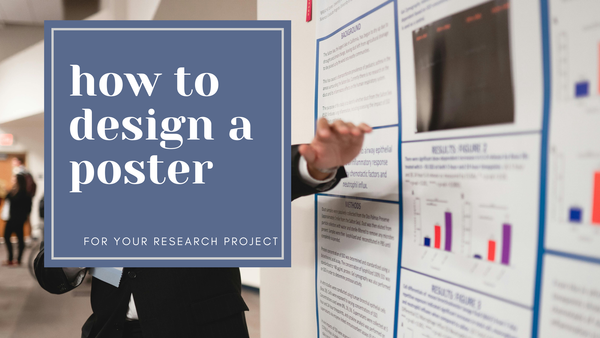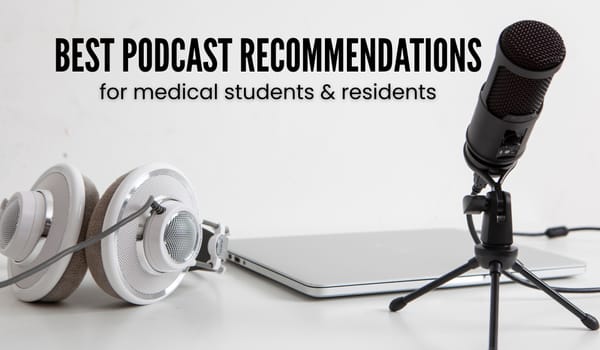US Residency Match Application: Tips & Resources
If you're thinking of applying to the United States for medical residency as an international medical graduate (IMG), it's a little terrifying.
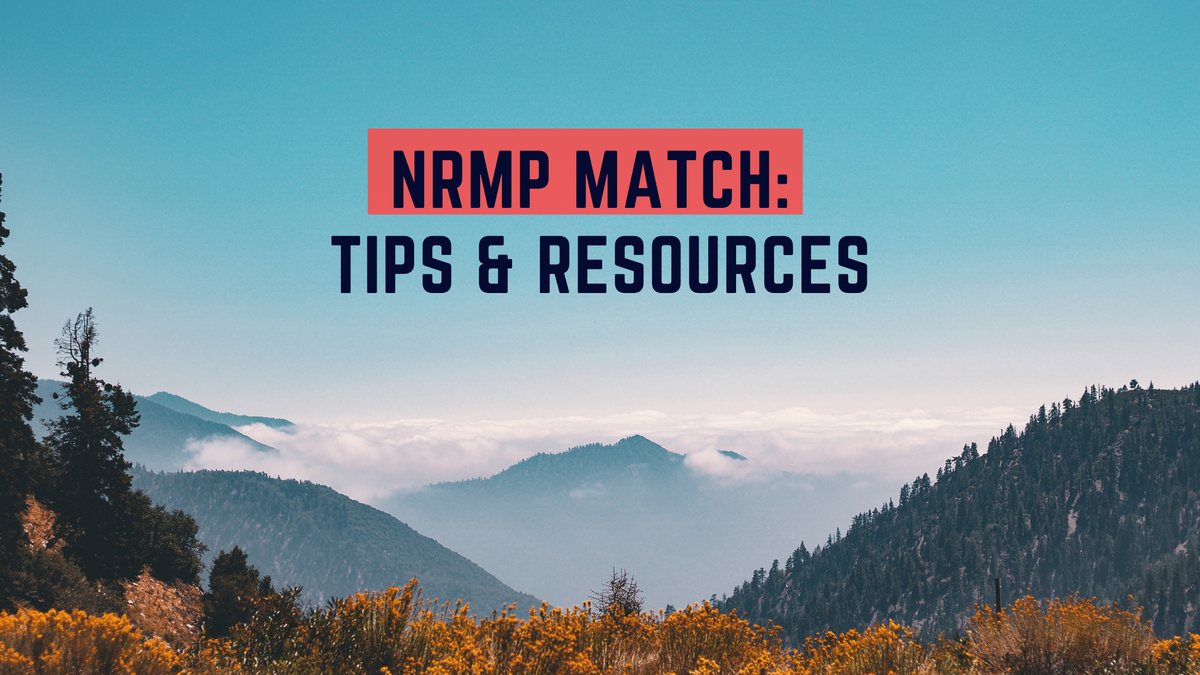
Approaching the US NRMP Match: A Guide for Beginners
If you are thinking about applying to the United States for your residency, then this NRMP Match Tips & Resources blog post should perfect for you.
It’s difficult to know where to get started because there is so.much.information, coming at you all at once. A lot of it is crazy abbreviations and long acronyms, and it’s easy to get lost. This guide is meant to be a stepping stone – all of the information is available freely online, but I’m compiling them into one place so that beginners can have an easy starting-off point.
If you would like to get all my tips & advice in one place, check out my relatively new and more up-to-date ebook, which includes everything I've learned. You can buy it here.
Requirements & Components of the Application:
- ECFMG certification: requires passing Step 1, Step 2CK and Step2CS* and having graduated from a medical school listed in the World Directory
- LORs: letters of recommendation (different for different specialties), preferably from U.S. doctors (based on a lot of what I’ve read)
- PS: personal statement
- Photo
- CV: curriculum vitae
- MPSE: Medical Student Performance Evaluation (used to be the Dean’s Letter)
- Special for emergency medicine: SLOE – standardized letter of evaluation
This is just a basic list – there’s a lot to know about each aspect, but hopefully this will give you an idea of what are the main components.
Resource #1: Timeline for the NRMP Match
The most important step is figuring out what the application timeline looks like. I stumbled across this blog post a few years ago, and it was the single most useful resource I’ve found to date. It’s called the U.S. Medical Residency Application Timeline and Checklist, found on the Match-A-Resident blog. I am linking the 2019-2020 timeline because the current (2020-2021) one is incredibly wonky, and hopefully next year’s won’t be so odd.
Timeline by Match-A-Resident: linked here.
Resource #2: Official Websites
It’s important to get familiar with the websites, the acronyms, etc. Here are some of the main ones that you should get comfortable looking at.
- NRMP – National Residency Match Program: the official website for The Match
- Match Data Reports: official data that NRMP releases every year – THIS data is the meat of objective information regarding the Match
- Charting Outcomes PDF – specific for each ‘category’ of applications, including US MD, US DO, and IMG students. This essentially tells you who is accepted into which specialty; what kind of board scores, research opportunities and other attributes applicants have, and who goes unmatched. The direct link is here for IMGs, there’s a separate document for AMGs (American medical graduates).
- The Program Director Survey: this is data collected directly from the PDs, divided by specialty, that gives insight into what PDs look at when looking over applications – do they care mostly about letters of recommendation (LORs) or Step scores or research or… and so on. It’s incredibly insightful.
- Match Data Reports: official data that NRMP releases every year – THIS data is the meat of objective information regarding the Match
- USMLE & NBME – the exams that we need to take: I’m sure you’ve heard lots about Step 1 and Steps 2CK and CS; if you’re interested in reading my blog post for the Step 1 resources I used, check that out here.
- more resources for USMLE coming soon!
- step-by-step video about registering for Step 1 (here)
- ECFMG – Educational Commission for Foreign Medical Graduates: the organization that will be giving us accreditation to work. You’ll get nice and cozy with the organization as you sign up to take your exams and eagerly await your medical license.
Cheeky edit: this isn’t an official website, per se, but it’s a really in-depth presentation about applying to residency that the medical school at UChicago posted for their students. You can find the link to that here. (You won’t believe how good it is until you go through it yourself, I bet.)
Resource #3: Residency Program Directories
There are two major websites, both of them free; the jury is still out on which one is better, so when I was looking for clerkships at residency programs, I looked at BOTH and aggregated the info from the two. The truth is, you will still need to scour the residency programs website for the most up-to-date information, but these two directories are a great starting point.
- FREIDA
- Residency Explorer
Importantly, I recently stumbled across “the spreadsheet.” I only perused the Emergency Medicine one, which can be found here, but on Reddit I saw a thread that linked many specialties.
Beware, because this spreadsheet can be harmful – people share their scores, their number of interviews, their impressions about programs. If you are eagerly awaiting your own invites, it might be hard to see other people share their successes. That being said, there are portions of the (EM) spreadsheet that don’t involve others’ data and are INCREDIBLY helpful. Examples are the following tabs: Program Benefits, Program Information, Pros/Cons List and so much more. Some of this information you can definitely assemble yourself, but it’s helpful to have some help with it when there are over 200+ programs.
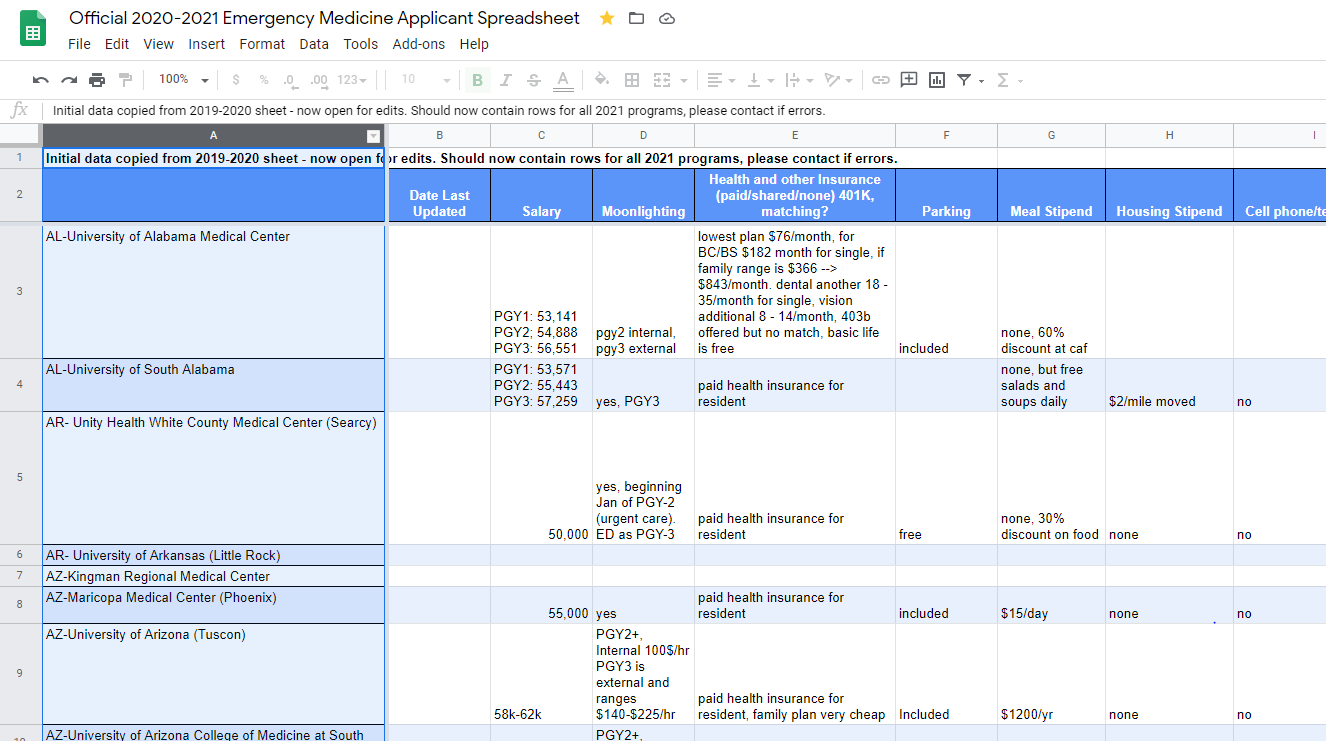
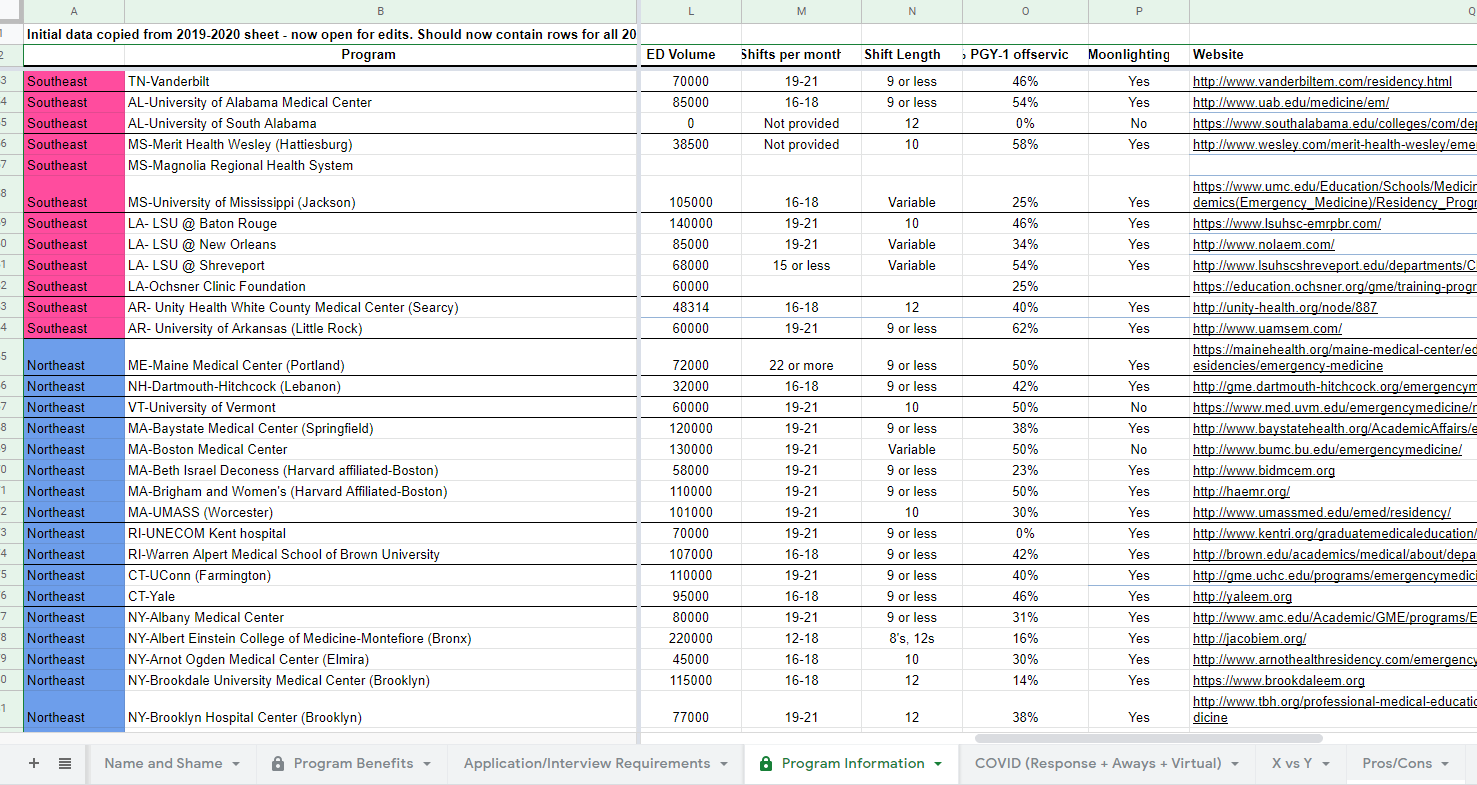
Click to see a close up of the Official EM NRMP Match Spreadsheet
Resource #4: National Organizations
I haven’t checked for each specialty, but I am fairly sure you have one. One what, you ask? A national organization. Since I know about the Emergency Medicine one(s), I’ll talk about those specifically.
I accidentally stumbled across EMRA, which stands for Emergency Medicine Residency Association. You may (rightfully) assume that this organization is meant for EM residents, but the truth is that they have an extensive “Medical Student Resource Section.” A lot of their material is free and up on their website, but I also decided to become a member for $60/year. I asked for my “Welcome Package” to be mailed to my US address (they don’t ship those internationally), and I received (amongst other goodies), a little book called “EMRA and CORD Student Advising Guide,” which goes into details about what is important for applying to EM.
Whether you’re interested in EM, IM (internal medicine), FM (family medicine), surgery, OBGYN, what have you: find their national organization. Think about joining. Get involved. Form (or join) and interest group. Find a mentor (I was matched with an EM mentor via EMRA). Attend their conferences (if it’s affordable). Read their newsletter, get familiar with the jargon.
Just get involved. That’s it. The first step.
P.S. EM actually has a few organizations, besides EMRA (AAEM, RSA, etc.), and your specialty might too. Try to figure out which is the best to join, or if you’re like me, get to know each one and use their student resources.
*UNIQUE: For EM, EMRA has made a really handy map of all the clerkships and residency programs, which can be found here. Check, your specialty might have a similar handy tool!
Resources I’ve Collected & Assembled re: the NRMP Match
- IMG Starter Kit: A Google Doc: I’d love to make this more extensive so please comment your additions, suggestions and I’ll add them in!
- IMG-Friendly Clerkship Programs: A Collaborative List: this is another Google Doc that requires all of our input – if you have rotated somewhere and recommend it, add it to the list! If you know of places that are friendly, add it to the list. This way we can all help each other out.
Social Media Resources:
Yes, really. Social media in this day and age is a GREAT source for insight into the Match and there are lots of accounts.
Discord:
I created a channel for us to talk, divided by year applying (this year, next year, etc.), and categorized by who is applying to what (each aspiring IM applicant received an “internalmedicine” role so we can easily write a chat to ALL internal med applicants, or all 2022 applicants, etc.). It’s a place that I hope will grow with time. The more we talk and help each other out, the better and more useful it will be. Here’s the link to join!
JOIN RESIDENCY MATCH DISCORD CHAT FOR IMGs
Twitter: #medtwitter
MedTwitter is an incredibly active corner of the Internet. My recommendation to you is the following:
- #MedStudentTwitter (self-explanatory)
- #MedEd and #FOAMed
Discover what hashtags represent your desired specialty.
- #embound: as a student interested in Emergency Medicine, I came across the #embound hashtag and through this I came across not only fellow aspiring EM doctors, but also program directors and attendings who were eagerly offering advice to us in the form of “Dear #EMbound Students, please note that sending “letters of interest” this early in the process is frowned up” (or something along those lines). Excellent information, straight from the source (aka the people reading our applications.)
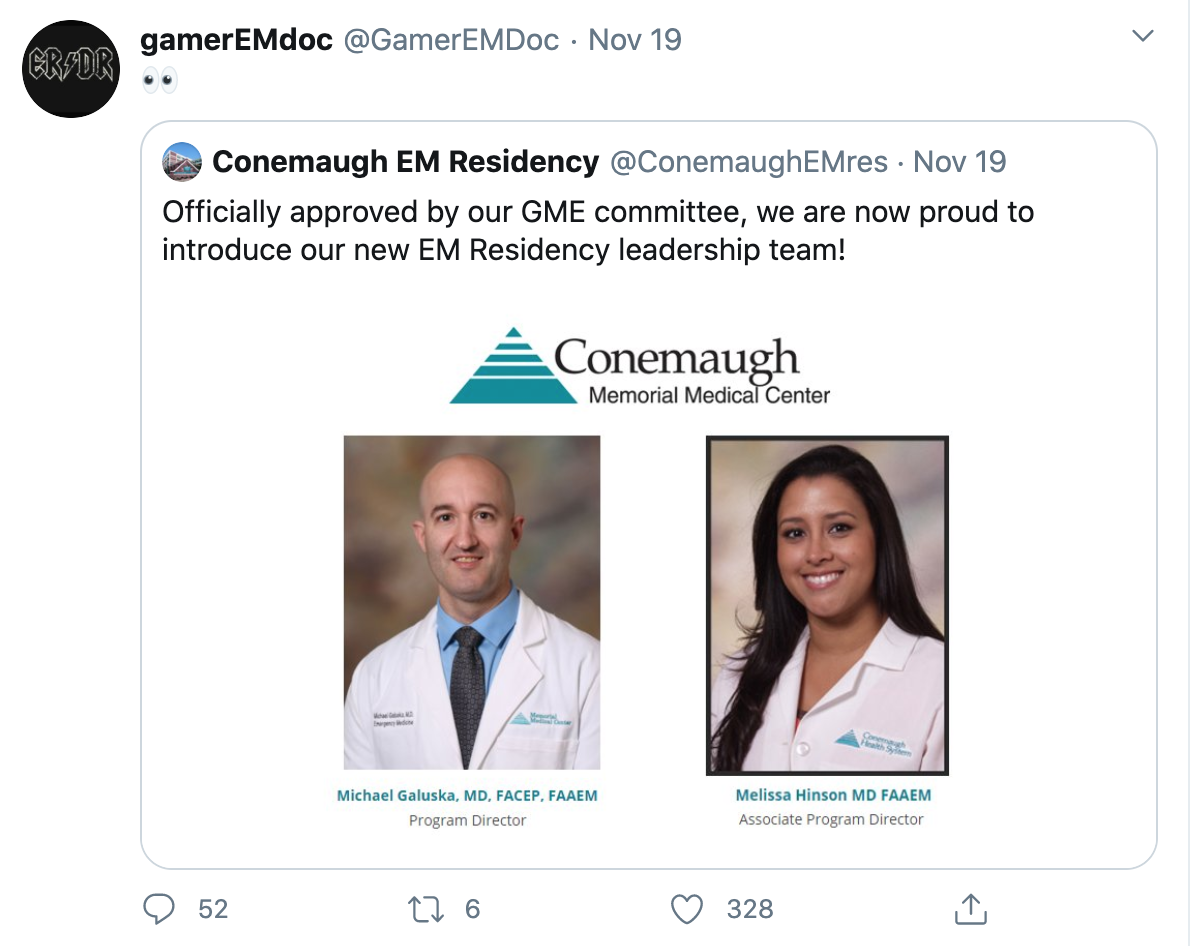
If you discover a useful hashtag for your intended field, share it with us in the comments below (or in the Discord chat). I’ll update this list as I get suggestions.
- Examples:
- Pediatrics: #tweetiatricians
- Internal medicine: #IMproud
- EM: #embound, #emergencymedicine
The Age of Zoom Hits NRMP Match
This year has been unique for many reasons (you don’t need me to tell you that); one particular way is that more and more programs are doing online Zoom sessions. They range from ‘meet & greets’ with the residents, to general info sessions with PDs, to educational sessions (‘interpreting AXRs in the ED’) to fun and games (hangouts, happy hours, etc.). All great ways to interact with your intended programs and learn lots more, without ever leaving the comfort of your lounge pants.
The season is now drawing to a close, but at the height of the application cycle, there were multiple sessions per night just for EM. Here’s a screenshot of October 2020 to give you an idea.
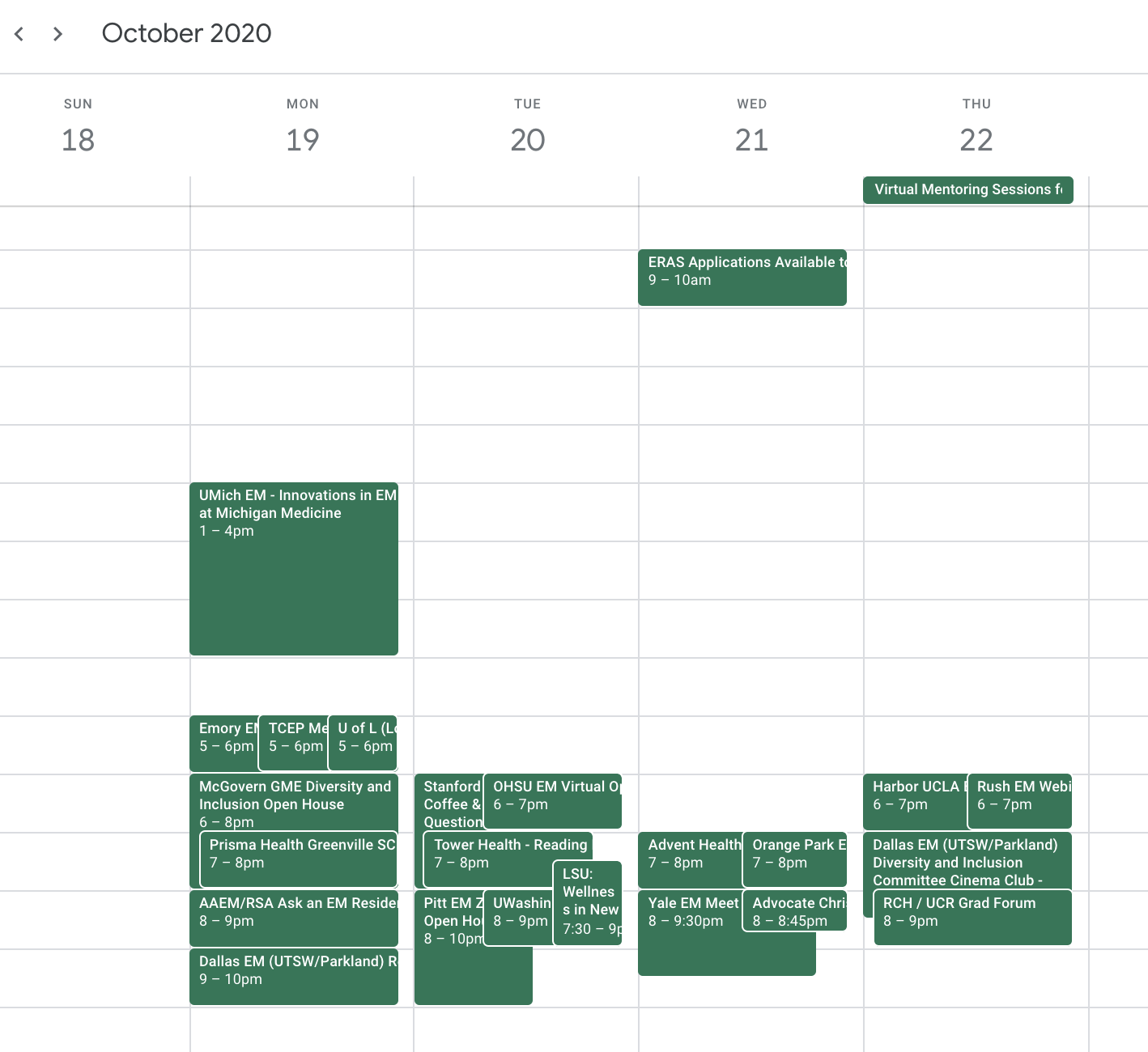
We have no idea what the future holds, but I hope next year’s cycle will continue along this same mindset because the usefulness is unparalleled.
Instagram:
There are dozens of useful Instagram accounts – I’ll break them down into three categories:
- Official Instagram accounts of programs (self-explanatory, I think)
- Accounts dedicated to helping students succeed in the NRMP Match (usually there is a monetary component, but they will share lots of free advice as well)
- @Inside_theMatch
- @MD2B Connect: a podcast (and they published The Successful Match 2017, available on Amazon)
- @WebShadowers: an account that interviews doctors from different specialties (4 each month) so you can get an in-depth idea of their life; this is mainly aimed at pre-meds but I don’t see why it couldn’t be helpful for us, too!
- Personal/studygram accounts of MS3s, MS4s and IMGs
- @medumentary: now an OBGYN resident; her YouTube is very valuable for IMGs and AMGs alike
- @drninalum: hospitalist, IMG “coach”
- @dr.challa: PGY-1 internal medicine resident trying to help other IMGs match
- @trilingual.med: MS4
- @megsmedicalmems: MS4
Reddit:
These subreddits are great resources, but keep in mind the following Internet “rules”: anonymity can bring out the worst in people, there is always a ‘success bias’ (meaning that people who do well on things are more likely to post their scores than people who don’t), and maintain common decency – some of these people might be fellow colleagues one day, so be respectful and helpful.
Also, different subreddits have different rules – for instance, you can’t post in the medical school one unless you have x amount of karma.
- Subreddit dedicated to each specialty (for example, r/EmergencyMedicine)
- Subreddit dedicated to medical school (Match threads are abundant) and r/Residency
- Subreddit dedicated to IMGs
Make friends; network, answer questions, make connections and help each other out. We are all in this together.
Phew, that was a lot. There’s so much to do and think about and it can get all very overwhelming (trust me, I know. I feel it too.) I put this guide together to introduce you to the world of NRMP Match. Sometimes it was hours and hours of searching before I came upon a useful resource, so I hope that by compiling them in one place, I can save you some time.
And finally, remember that we are stronger together. Let’s help each other out – if you find something useful, be sure to share it below, message me on Instagram or share it in Discord.
We are stronger together.


